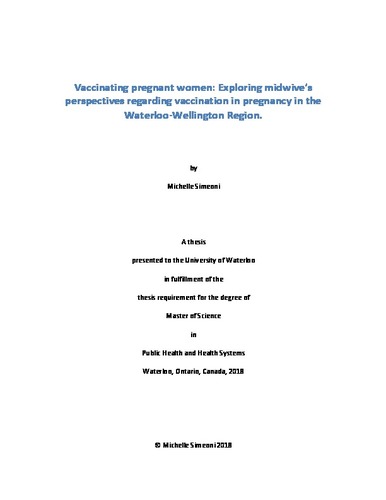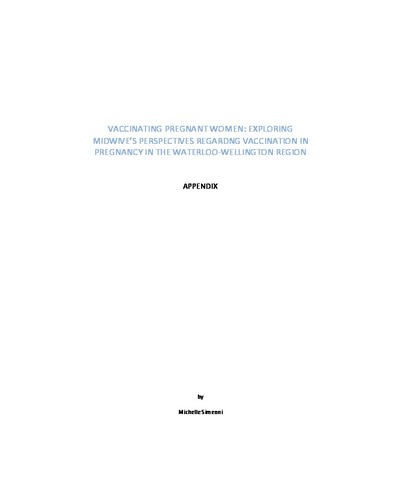| dc.contributor.author | Simeoni, Michelle | |
| dc.date.accessioned | 2018-05-25 14:24:29 (GMT) | |
| dc.date.available | 2018-05-25 14:24:29 (GMT) | |
| dc.date.issued | 2018-05-25 | |
| dc.date.submitted | 2018-04-23 | |
| dc.identifier.uri | http://hdl.handle.net/10012/13358 | |
| dc.description.abstract | Background: Within the Canadian context midwives play a crucial role in providing prenatal care for pregnant women and this encompasses vaccine recommendations. Although administration of vaccines is outside midwives’ scope of practice, they are considered important in discussing and recommending vaccines, as their medical advice is highly trusted and valued by patients. Vaccination of pregnant women is critical because risk of influenza related morbidity and mortality increases during pregnancy. Despite strong recommendations by medical and public health bodies such as NACI since 2007, influenza vaccine uptake amongst pregnant women remains sub-optimal and well below the recommended target of 80 percent. Prior to the H1N1 pandemic it was estimated that approximately 15% of pregnant women were vaccinated annually against seasonal influenza in Canada. Rates have remained similar in subsequent years despite the significant risks posed for mother and fetus. Despite this knowledge, few studies have been conducted in the Canadian context to specifically investigate the factors that influence the knowledge, attitudes, beliefs and behaviours (KABB) of midwives regarding vaccination in pregnancy. Therefore the unique focus of my project is to specifically investigate the KABB of midwives in the Waterloo-Wellington, Ontario region regarding vaccination during pregnancy.
Research Aim and Objectives: To gain a better understanding of the KABB of midwives regarding vaccination during pregnancy. My project will offer data from a region where I hypothesize that midwifery practice is shaped by the preferences of a diverse subset of the population identified as Mennonite.
Methods: A qualitative approach was taken using semi-structured in-depth interviews.
This study used a qualitative, constructivist design in gathering experiences and stories from midwives to determine their KABB regarding vaccination within their field using semi-structured interviews. The Theoretical Domains Framework was consulted for the formulation of the interview guide as well as for the coding and analysis of data collected. Both deductive and inductive approaches were used to code the data in order to ensure that themes that lie outside the framework will also emerge. The findings from this study will be incorporated into similar and more comprehensive research projects conducted by the Canadian Immunization Research Network (CIRN) focusing on KABB regarding immunization and maternal care providers. Findings from this research will also shed light on the fragmentation and gaps within the field of midwifery and the guidelines and regulations that shape midwifery practice in Canada.
Results: The research project explored the KABB of midwives in the Waterloo-Wellington Region and their perceived role in the discussion and recommendation of the influenza vaccination while also capturing general vaccine perceptions. Participants shed light on the personal and systemic barriers that are currently limiting midwives from incorporating vaccine discussion and recommendation into their routine practice and provided potential recommendations on addressing these barriers in practice. More specifically, this project investigated the impact of the Mennonite community’s engagement with health services, such as vaccination and birthing programs through semi-structured interviewing of midwives who provide care to this population. It should be noted however that no such research had investigated this aspect of the Midwifery or Mennonite population previously and these findings are novel.
Conclusions: This study has only begun to address the gap in quality qualitative research exploring the KABB of midwives in the Canadian context regarding vaccine discussion and recommendation practices. The research project provides further information and recommendations regarding barriers to the promotion, discussion and recommendation of immunization in midwifery practice in the Waterloo-Wellington Region. Findings may also contribute to developing public health and vaccination promotion services to reach pregnant women in the Waterloo-Wellington Region that share demographic and contextual characteristics as participants in the study. Participants provided suggestions to how vaccine discussion and recommendation can be more effectively incorporated into routine midwifery practice based on their experiences in the current maternal health care system. Implementation of these strategies, however, relies on developing more comprehensive clinical guidelines in midwifery care, therefore it is essential to further assess vaccination in pregnancy from the health care provider perspective and the barriers that are currently preventing promotion of vaccines. | en |
| dc.language.iso | en | en |
| dc.publisher | University of Waterloo | en |
| dc.subject | Midwives | en |
| dc.subject | Midwife | en |
| dc.subject | Midwifery | en |
| dc.subject | Pregnancy | en |
| dc.subject | Vaccination | en |
| dc.subject | Flu Vaccine | en |
| dc.subject | KABB (knowledge, attitudes, beliefs, behaviours) | en |
| dc.subject | Public Health | en |
| dc.subject | Mennonite | en |
| dc.subject | Influenza | en |
| dc.subject | Qualitative Research Methods | en |
| dc.title | Vaccinating pregnant women: Exploring midwive’s perspectives regarding vaccination in pregnancy in the Waterloo-Wellington Region. | en |
| dc.type | Master Thesis | en |
| dc.pending | false | |
| uws-etd.degree.department | School of Public Health and Health Systems | en |
| uws-etd.degree.discipline | Public Health and Health Systems | en |
| uws-etd.degree.grantor | University of Waterloo | en |
| uws-etd.degree | Master of Science | en |
| uws.contributor.advisor | Meyer, Samantha | |
| uws.contributor.affiliation1 | Faculty of Applied Health Sciences | en |
| uws.published.city | Waterloo | en |
| uws.published.country | Canada | en |
| uws.published.province | Ontario | en |
| uws.typeOfResource | Text | en |
| uws.peerReviewStatus | Unreviewed | en |
| uws.scholarLevel | Graduate | en |


